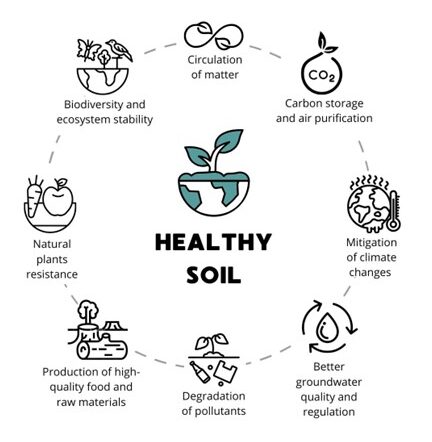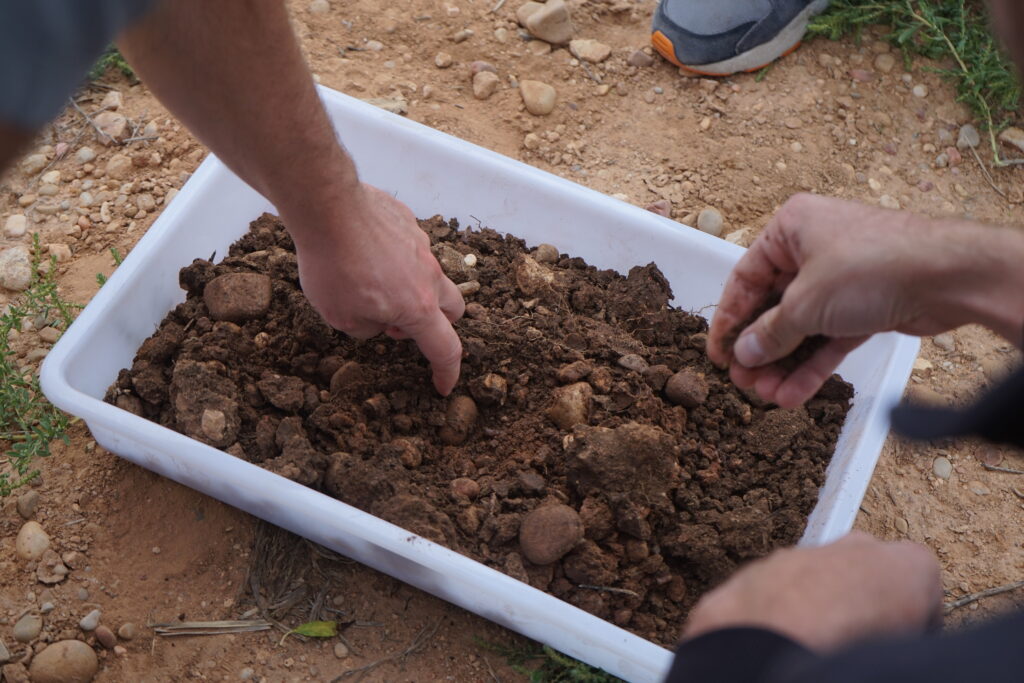Soil is the surface layer of the Earth’s crust, the ground beneath our feet, and an essential part of human living space. While its protection is most often discussed in the context of agriculture and food production, soil plays a far greater role. For example, soil microorganisms transform inorganic substances into organic compounds, regulate water cycles, and filter pollutants. But how does it affect us?
The biological and chemical processes occurring in soil are essential for raw material production but also for biodiversity conservation, carbon capture and storage, pathogen neutralization, and climate change mitigation. With a growing population, technological advancements, and high greenhouse gas emissions, soil health has become a critical determinant of human well-being and planetary survival.
The Threats to Soil Health
Each year, approximately 12 million hectares of land are degraded worldwide due to human activities such as intensive agriculture, deforestation, urbanization, industrial operations, and pollution. Erosion, compaction, and loss of soil microbial biodiversity are just some of the challenges affecting our soils. Many regions also struggle with salinization and poor groundwater management.
Over the past 50 years, nearly one-third of the world’s farmland has been abandoned due to human-induced degradation. In 2016, during the World Business Council for Sustainable Development forum, CEOs from over 200 leading global companies in accounting, chemistry, agriculture, engineering, and food industries were surprised to learn about the critical role of soil beyond agriculture. Many business leaders remain unaware that their profits may depend on soil health or that its deterioration poses significant risks. In 2016 alone, agricultural losses due to drought were estimated at 14 billion US dollars. When soils are mechanically compacted and stripped of organic matter, they lose their ability to absorb and retain water, increasing the risk of both floods and droughts.
Solutions for Soil Protection and Restoration
In response to these challenges, an increasing number of initiatives promoting sustainable soil management and regenerative practices have emerged. Soil health plays a central role in the European Union’s objectives, which focus on soil protection and rehabilitation to ensure agriculture’s long-term productivity and enhance citizens’ quality of life. Horizon Europe, the EU’s largest research and innovation funding program, identifies soil health as one of its five key areas of action. The Mission Soil (A Soil Deal for Europe) supports Europe’s commitment to achieving the 2030 Sustainable Development Goals (SDGs), adopted by UN member states in 2015, as well as the objectives of the European Green Deal.
As part of the Green Deal, long-term strategies such as Farm to Fork and the EU Biodiversity Strategy for 2030 are being implemented. The Mission Soil reinforces these efforts by promoting environmentally friendly agricultural practices, reducing the use of synthetic fertilizers and pesticides, and supporting regenerative actions to protect soil microorganisms. The mission aims to restore 75% of degraded soils in Europe by 2030. To reach that goal, it funds scientific research, field studies, demonstration farms, and innovative projects, including NBSOIL, which focuses on nature-based solutions for soil health.
How NBSOIL Is Contributing to Soil Health Restoration
The NBSOIL Project aims to improve the availability and quality of soil advisory services with an approach to sustainable land management practices – both for farmers and clients from other sectors.
There is currently a growing interest in regenerative agriculture, precision farming, and the implementation of natural pest management techniques. To support the trend towards making the right choices in land management practices, the importance of advisory services in this area needs to be emphasised.

Among the services most in demand are to advice on how to improve soil efficiency in agriculture and forestry; advice on how to reclaim urban and industrial soils; and advice on how to restore soil health in valuable natural areas, deforested regions and wetlands.
Soil advisors trained through the NBSOIL Project play a crucial role in assisting beneficiaries
of mandatory and voluntary Common Agricultural Policy (CAP) funding programmes related to soil health. Their role includes promoting sustainable agricultural and forestry practices, advising on fertilisation, preventing soil erosion, minimising pollution, developing land restoration plans, and sharing knowledge on modern, practical soil management solutions.
Soil Advisory Service Models in Europe
As part of the NBSOIL Project, the Polish Agricultural Advisory Centre (CDR) conducted a study on existing soil advisory service models across Europe. The findings revealed that while soil advisory services are widely available in the agricultural and forestry sectors and are relatively well-developed and commercialized in urban and degraded areas, they are extremely rare in the paludiculture sector, which focuses on wetland crops production.
The study identified two main service models. Some operate as independent self-contained soil advisory services, while others are integrated into general soil advice integrated into agricultural advisory frameworks (e.g., agricultural advisory). According to the results, dedicated soil advisory services are more common in urban and degraded areas, likely due to their higher commercialization. In contrast, in agriculture and forestry, soil advisory services
are provided in various forms at a similar rate, probably due to the financial support available through the CAP.
The CDR report highlights commercial soil advisory models (based on data from selected EU countries) as a potentially more efficient approach to responding quickly and effectively to the needs of sustainable soil management compared to non-commercial services. The study found that private advisors and advisory firms dominate in urban areas, whereas in agriculture and forestry, commercial services account for about 50% of all advisory services. CDR is working to systematize possible business and commercial models for providing soil advisory services across different sectors.
Building a Sustainable Future
As soil degradation accelerates, proactive action is essential. Soil health requires education and cross-sector collaboration among farmers, scientists, and NGOs. By combining joint efforts, innovations, and investments in soil-friendly technologies, we can work toward restoration.
Beyond structuring soil advisory services, EU policy recommendations should define the types of services provided and establish institutions offering certified training for advisors. Raising public awareness of soil health is equally important. A holistic approach—encompassing agriculture, industry, and urban planning—is necessary for sustainable soil management. Each of us can contribute by making conscious consumer choices and supporting sustainable production systems. Healthy soil is not only a concern for future generations but a crucial element of our present quality of life
